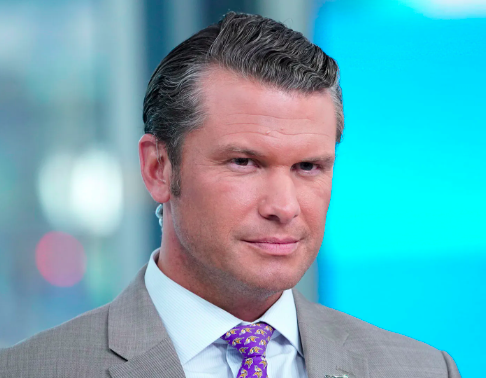Fox News personality and U.S. Secretary of Defense Pete Hegseth has once again found himself at the center of controversy—this time over an unexpected tattoo revelation. Observant viewers noticed unfamiliar Arabic script inked beneath his arm in a recently shared image, adding fuel to an already heated debate over his body art.
The photo in question was posted on Tuesday, showing Hegseth engaging in jumping jacks and push-ups alongside Navy SEALs at Joint Base Pearl Harbor-Hickam. However, what caught the internet’s attention wasn’t his workout routine but the bold new tattoo, appearing beneath his existing ‘Deus Vult’ ink—a Latin phrase meaning ‘God wills it,’ famously associated with the Crusades.
What Does the Tattoo Say?
The newly revealed tattoo spells out the Arabic word ‘kafir’ (كافر), which translates to ‘disbeliever’ or ‘infidel’ in Islamic teachings. This revelation quickly sparked outrage among activists, with some accusing Hegseth of promoting Islamophobia through his choice of body art.
New York-based pro-Palestinian activist Nerdeen Kiswani took to social media to voice her concerns, stating, “Hegseth just got a ‘kafir’ tattoo under his ‘Deus Vult’ tattoo—a Crusader slogan. This is not merely a personal choice; it is a blatant symbol of Islamophobia from the person overseeing U.S. military operations.”
British writer Tam Hussein also weighed in, saying, “To the Muslim community, this tattoo will be perceived as a public declaration of Hegseth’s hostility towards them.”
Supporters Defend the Tattoo
While critics argue that Hegseth’s tattoo choices reflect dangerous ideological leanings, others have come to his defense. Many pointed out that ‘kafir’ is a commonly recognized term among military veterans, particularly those who served in Middle Eastern conflicts, as a symbol of defiance against Islamic extremism.
X user Dilly Hussain from UK-based news outlet 5 Pillars stated, “Muslims should not be surprised or offended by Pete Hegseth’s ‘kafir’ and ‘Deus Vult’ tattoos. They are a reflection of America’s foreign policy and how it views Islam and Muslims.”
Not His First Controversial Tattoo
Hegseth is no stranger to scrutiny over his tattoos. Over the years, he has acquired a number of inked symbols that have sparked debate, including:
- Jerusalem Cross on his chest: A large Christian cross surrounded by four smaller crosses, historically associated with the Kingdom of Jerusalem during the Crusades.
- ‘Deus Vult’ on his bicep: A phrase famously used as a rallying cry during the First Crusade.
- Cross and Sword on his forearm: Inspired by Matthew 10:34, which states, ‘Do not think that I have come to bring peace to the earth. I did not come to bring peace, but a sword.’
- Chi-Rho Symbol on his upper arm: An ancient Christian monogram representing the first two letters of Christ’s name in Greek.
These tattoos have led to accusations of religious extremism, particularly during his nomination as Secretary of Defense. Some Democratic lawmakers have previously raised concerns about his Jerusalem Cross tattoo, arguing that it symbolizes right-wing Christian nationalism.
Hegseth’s Response to the Backlash
Hegseth has largely dismissed the controversy surrounding his tattoos, framing them as personal expressions of faith and patriotism. When asked about the backlash, he simply responded, “People will believe what they want to believe. My tattoos are a reflection of my beliefs, my service, and my commitment to defending American values.”
During a podcast interview with Shawn Ryan, Hegseth shared that he was once barred from serving on a National Guard security detail for the Biden inauguration due to concerns over his tattoos. “I was labeled an extremist because of a tattoo, and my orders were rescinded. A Jerusalem cross tattoo, which is merely a Christian symbol,” he explained.
A Tattoo with a Deeper Meaning?
Despite the uproar, it remains uncertain whether the ‘kafir’ tattoo is new or if it has simply gone unnoticed until now. Given its placement under his arm, it’s possible it was inked years ago and only recently caught public attention.
The Department of Defense has yet to issue a statement on the matter, and Hegseth continues his visits with U.S. troops in Guam and Hawaii. While his tattoos may remain a source of controversy, one thing is clear: Pete Hegseth is unapologetic about his beliefs, and his body art tells a story that is deeply personal to him.
As debates over his tattoos rage on, the broader conversation about symbolism, religious imagery, and military culture continues to unfold. Whether viewed as an act of defiance or simply an expression of identity, Hegseth’s ink is a permanent statement—one that has certainly left a lasting impression on both his supporters and critics.

Sophia Reynolds is a dedicated journalist and a key contributor to Storyoftheday24.com. With a passion for uncovering compelling stories, Sophia Reynolds delivers insightful, well-researched news across various categories. Known for breaking down complex topics into engaging and accessible content, Sophia Reynolds has built a reputation for accuracy and reliability. With years of experience in the media industry, Sophia Reynolds remains committed to providing readers with timely and trustworthy news, making them a respected voice in modern journalism.
